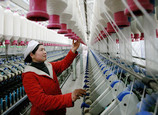
According to a study of the China Rich List published by the Hurun Report, 17 percent of those listed were being investigated or had been arrested. Some have even been executed. Due to this high percentage, the Hurun list was also dubbed the "kill pigs list."
The number reflects the hazy judicial environment when doing business in China. The country has accumulated gigantic wealth over the past three decades, but the legal framework has not caught up.
It is the nature of business to maximize profit, but if the pursuit of interests cannot be regulated by institutions and laws, the growth of illegal transactions and the trading of power for money will be encouraged. A lack of morals can be blamed when one is disgraced, however, the fact that 17 percent of these moguls have fallen this way warns us that there are still deep flaws in our business environment.
At the beginning of the reform and opening-up period, there were lots of uncertainties in the distribution of wealth and the development model of enterprises, which could be exploited to make money.
Take Zhou Zhengyi for example, once China's 11th richest man on the Forbes list and former chairman of the Shanghai Nongkai Development Group, who changed his registered capital from 100 million yuan ($16 million) to 800 million using a fraudulent capital verification report. Zhou is now in prison serving a 16-year sentence.
As illicit business-government connections are still rampant, many mogul's falls are related to bribery. Prior to 2011, 20 out of the 24 disgraced moguls had been sentenced and 10 of them were sentenced for the crime of bribery, including Huang Guangyu, once the richest person on the Chinese mainland in 2004-05 according to the Hurun report. Others included Yang Bin, once the No.2 richest person on the China Rich List, and Li Songjian, who was once valued at 1.7 billion yuan by Hurun.
These events are a sign of the times, so we need to analyze them within the context of institutions. Against the current complex business environment, strengthening supervision and the ability to investigate wealth is necessary.
Such supervision and investigation should not just be limited to tycoons on China's Rich List, it should also be expanded to the gray income of the moguls who have not been listed and the authorities related to business.
Only by improving the whole business environment can we make sure that moguls on the list are truly wealthy, both in assets and morals.
















 Most feared Spring Festival questions
Most feared Spring Festival questions


![]()
